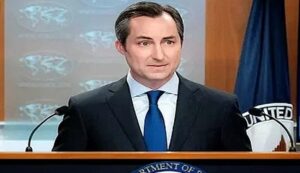US State Department reacts to Bangladesh’s attempted constitutional changes
Washington: In response to media’s inquiry on the issue at a press briefing on Tuesday, the US State Department recognized Attorney General Mohammad Asaduzzaman of Bangladesh’s demand that secularism be removed from the nation’s Constitution. Following assaults on religious minorities in Chittagong, tensions are on the rise.

“I’ll take that back and see if we have anything to say about it,” US State Department spokesman Matthew Miller said in response to media’s inquiry regarding Bangladesh’s Attorney General Mohammad Asaduzzaman’s support for eliminating the term “secular” from the Constitution.
The US did, however, make clear that it opposes the government’s use of force to quell nonviolent protesters in Bangladesh. This remark comes after a social media post denouncing ISKCON sparked altercations between Hindu community members and police officers in Chittagong.
“I’m not going to speak to private diplomatic engagements from here, but we have made it clear to the government of Bangladesh, as we do to countries around the world, that we support the right to peaceful protest and that no government should engage in violent crackdowns on peaceful demonstrations,” the spokesperson for the US department stated.
Blank bullets were fired during combined army and police operations in Chittagong as the conflict intensified. India denounced the assault on the Hindu community in Chittagong on November 6.
“We have noticed that there have been attacks on the Hindu community in Chittagong, Bangladesh,” said Randhir Jaiswal, a spokesman for the Ministry of External Affairs. Following defamatory social media postings that targeted Hindu religious organizations, their homes and businesses were robbed.
Jaiswal called for decisive action from Bangladesh. “These postings and the ensuing unlawful, criminal activity are known to be the work of extreme groups. Tensions within the community will inevitably increase as a result of such instances. We encourage the Government of Bangladesh to take firm action against extremist forces and to safeguard the safety of Hindus,” he added.
Mohammad Asaduzzaman, the attorney general of Bangladesh, demanded significant constitutional amendments earlier this week, proposing the elimination of Bengali nationalism, socialism, and secularism. Additionally, he suggested taking away Bangabandhu Sheikh Mujibur Rahman’s title of “Father of the Nation,” according to United News of Bangladesh (UNB).
Asaduzzaman said that socialism and secularism do not accurately represent the reality of a country where 90% of the population is Muslim at hearings on the 15th Constitutional Amendment. He advocated for the restoration of unwavering “faith in Allah” and a return to religion-based values.
Additionally, he criticized the applicability of Bengali nationalism in Article 9 of their Constitution, arguing that it is incompatible with contemporary democratic ideals. He called the Liberation War and the July 2024 revolution, which witnessed sacrifices from revolutionaries like Abu Sayed and Mugdho, betrayed by the 15th Amendment. Asaduzzaman said that the amendment extended authoritarian control and betrayed the sacrifices of martyrs such as Abu Sayed and Mugdho. “It’s a direct assault on democracy and the rule of law.”
In 2011, the caretaker government arrangement was abolished and Mujibur Rahman was acknowledged as the Father of the Nation by the 15th Amendment to the Constitution of Bangladesh. According to Asaduzzaman, its provisions have stoked discord and political instability.
He made the case for reintroducing referendums, claiming that doing away with them compromises democratic accountability. “The amendment allows Members of Parliament elected by ‘electoral engineering’ to unilaterally remove this important democratic mechanism,” he said.
Additionally, the Attorney General denounced as divisive the use of language as a foundation for national identity in Article 6. He said that Articles 7(ka) and 7(kha) of Bangladesh’s constitution should be repealed since they are authoritarian and undermine democracy.





